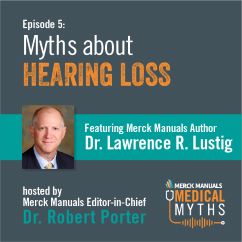Aging affects the function of the ears, nose, and throat in varying degrees. The effects of aging result from many factors such as wear and tear caused by overuse of the voice, exposure to loud noise, and the cumulative effect of infections, as well as the effect of substances such as medications, alcohol, and tobacco. Some older adults are affected more than others.
A progressive loss of hearing (presbycusis), especially for higher-pitched sounds, is common. Hearing impairment is common among older adults, and the rate of hearing impairment increases with age. Over one-quarter of people age 65 years and older have hearing impairment. By age 75, one-third of people have signs of hearing impairment. Hearing impairment can alter a person's ability to understand speech. Hearing aids can help many people with hearing loss hear better. When the hearing is so bad that a hearing aid does not help, a cochlear implant can be considered. A cochlear implant is a device that directly stimulates the hearing nerve in response to sound.
Vestibular imbalance and ringing in the ears (tinnitus) are also more common among older adults but are not normal. Changes occur because some structures in the ear that help with hearing or balance deteriorate slightly, or a tumor or disorder may have developed.
The sense of smell may decline with age. The decline in the sense of smell also affects the sense of taste so that foods sometimes do not taste the same (see also Changes in the Body With Aging: Mouth and Nose).
Changes in the voice also occur with age. The tissues in the larynx may stiffen, affecting the pitch and quality of the voice and causing hoarseness. Changes in the tissues of the throat (pharynx) may lead to the leakage of food or fluids into the trachea during swallowing (aspiration). If persistent or severe, aspiration may cause pneumonia.


